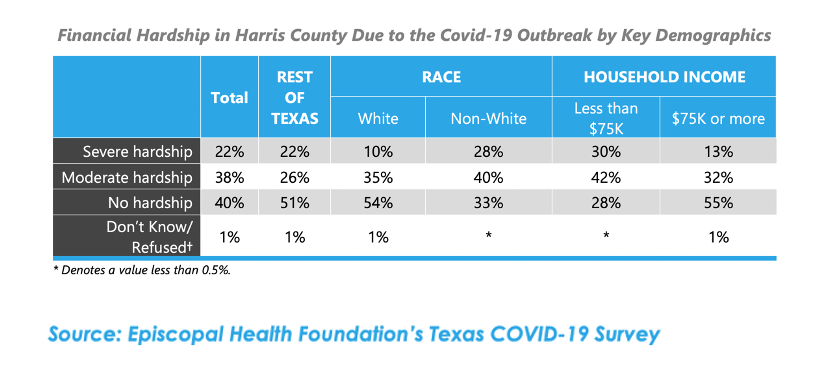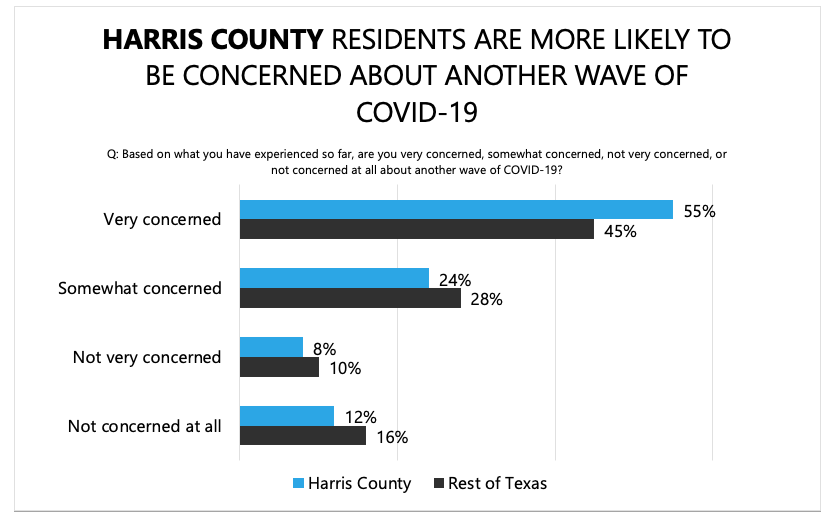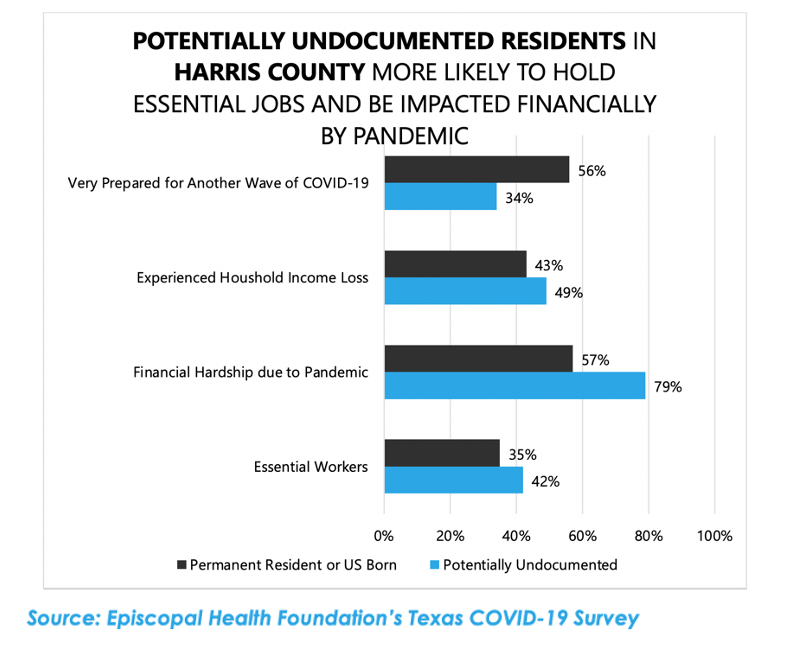
HARRIS COUNTY REPORT
A majority of people who live in Harris County say they’ve suffered financial troubles during COVID-19 and almost half say they or someone in their household has lost a job, lost a business, or had their wages or hours reduced.
Those are just some of the findings from Episcopal Health Foundation’s survey of the impacts of COVID-19 in Harris County that was co-sponsored by Arnold Ventures.
Researchers found that people in Harris County were more likely to suffer financial hardships than those living in other areas of Texas. The survey finds that 60% of Harris County residents say they experienced financial hardship and 44% say they lost household income due to COVID-19. That’s compared to statewide survey results that show around half (48%) of all Texans reported financial difficulty and 36% say they lost household income.
In Harris County, the survey finds that 72% of residents with household incomes under $75,000 a year say they experienced financial troubles compared to less than half (45%) of residents with annual incomes above $75,000. Researchers also found that Black and Hispanic residents in Harris County (68%) are also more likely to suffer financially than White residents (45%).

The wide-ranging survey asked Harris County residents about many different issues related to the pandemic including their mental health, their likelihood to get a COVID-19 vaccine, views on government response, concerns about the future and more.
More people in Harris County are uninsured after COVID-19
The survey confirmed that Harris County continues to have a high rate of people without health insurance and the pandemic has made the situation worse. Researchers found that more than one third (37%) of Harris County residents between the ages of 18-64 said they are uninsured and 10% said they lost their health insurance at some point during the pandemic.
Worries about the COVID-19 outbreak getting worse in Harris County
More than half of people living in Harris County (55%) say they’re very concerned about another wave of COVID-19. Researchers found that’s higher than the percentage of overall Texans (46%) with the same concerns.
Potentially undocumented residents in Harris County more likely to be essential workers and impacted financially
Researchers found that 13% of Harris County residents were considered potentially undocumented immigrants. The survey finds that those who are potentially undocumented were more likely to be essential workers (42%) than those born in the U.S. or are permanent residents (35%), and that these residents were also more likely to have experienced financial troubles during COVID-19 (79%) than those who are permanent residents or born in the U.S. (57%).
10 additional highlights from the COVID-19 in Harris County report
- 31% say they or someone in their household skipped or postponed medical care because of the pandemic
- 20% say they cannot access telemedicine resources because they don’t have a device, don’t have internet access, or don’t know how
- 44% say that worry or stress related to COVID-19 has negatively impacted their mental health
- 44% say they are very likely to get a COVID-19 vaccine
- 56% say it’s very important for federal or state government to provide assistance with health care costs
- 23% say they received any kind of help from a nonprofit organization, food bank or their social network
- 14% say they received food from a nonprofit organization or food bank
- 53% say they’re very worried that Texas’ local economy will suffer even more because of the pandemic
- 52% say they’re very worried that the state’s health system will be overrun and people won’t be able to get needed medical care
- 39% say they think it will be 6 months to a year before life returns to normal
METHODOLOGY
The Episcopal Health Foundation (EHF) Texas COVID-19 Survey was conducted by telephone August 5 – September 18, 2020 among a random representative sample of 1,889 adults age 18 and older living in the state of Texas including 535 respondents from Harris County (note: persons without a telephone could not be included in the random selection process). Interviews in Harris County were administered in English and Spanish, combining random samples of both landline (98) and cellular telephones (437, including 350 who had no landline telephone).
The survey data are weighted to balance the sample demographics to match estimates for the Harris County adult population. A multi-stage weighting design was applied to ensure an accurate representation of the Harris County adult population. The margin of sampling error for the Harris County sample is plus or minus 6 percentage points for results based on the total sample. For results based on subgroups, the margin of sampling error may be higher. All differences noted in the report are statistically significant at the p<.05 level.


